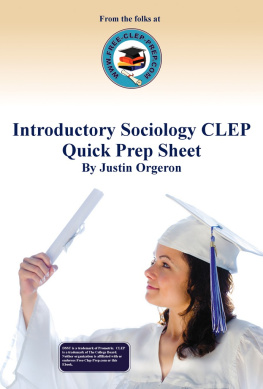Introductory Sociology CLEP Quick Prep Sheet
by Justin Orgeron
www.Free-Clep-Prep.com
Copyright 2013 Justin Orgeron
Smashwords Edition
W elcome to the Quick Prep Sheet for the Introductory Sociology DSST!
Sociology is the scientific study of social structure, or patterns in social relationships. Although much of sociology is focused on the study of human interaction, the interactions of cultures, institutions, and groups also falls into the study of sociology.
Well take you through all this below. I know its a lot, but take your time and go through it all thoroughly. Weve tried to make it all as clear and comprehensive as possible, but if you get confused on something, do some further research! Then come back when you fully understand the concepts and keep reading.
Remember, I always suggest you use multiple resources for these exams and that advice hasnt changed. Once youre done here, go take our free full-length online practice test (http://practice-exams.free-clep-prep.com/login.php) and make sure you have the material down. Bring this Ebook with you to the testing center and use it for some last minute study in the car. Above all, dont stress out over the exam! You can do this!
Note: Youll probably get some questions on the exams asking for specific percentage numbers. (Poverty, Divorce, etc.) Below weve listed the numbers from the latest census, but the correct number changes based on what year your exam was written. Fun stuff, we know. If you get a question asking for percentages, pick the one closest to what we have listed below and you should be fine)
With all that out of the way on to the studying!
Sociological Perspectives and Theories
Three Major Sociological Paradigms
 Social Functionalism Social functionalism is the idea that the social structure is a whole, and regards norms and institutions are parts of a body that functions. In this viewpoint of sociology, all actions or interactions serve a functional purpose.
Social Functionalism Social functionalism is the idea that the social structure is a whole, and regards norms and institutions are parts of a body that functions. In this viewpoint of sociology, all actions or interactions serve a functional purpose.
 Conflict Theory Conflict theorists examine how class conflict and differences in power result in social institutions, or in many cases, social stratification. Comparatively, functional theorists would try to understand how phenomenon such as social stratification fit into the greater part of society and provide some piece of function.
Conflict Theory Conflict theorists examine how class conflict and differences in power result in social institutions, or in many cases, social stratification. Comparatively, functional theorists would try to understand how phenomenon such as social stratification fit into the greater part of society and provide some piece of function.
 Symbolic Interactionism Symbolic Interactionism is based upon the belief that society as we know it is based on symbols. These symbols can be our words, gestures, or even social rules and laws. These often change, so followers of this theory believe that society itself is always in a state of change as well.
Symbolic Interactionism Symbolic Interactionism is based upon the belief that society as we know it is based on symbols. These symbols can be our words, gestures, or even social rules and laws. These often change, so followers of this theory believe that society itself is always in a state of change as well.
Ethnocentrism Ethnocentrism is the tendency to judge other cultures by the standards of your own culture. For example, in China and Indian cultures, it is not uncommon for males to hold hands. However, from an American point of view, this is extremely unusual and weird.
Sociological Imagination Sociological imagination is one of the founding principles of sociology. Essentially, it is the insight that is given by understanding interactions in sociology. It can also be phrased as the understanding that certain outcomes are based on the social context, people, and actions that take place.
Interpretive Sociology Interpretive sociology is also known as verstehen. It is best understood as the study of how people associate meanings to their interactions and communication with other people. Basically, the act of a wave can mean different things in different cultures. Attempting to understand the meaning behind this interaction in various cultures is verstehen.
Versetehen Versetehen is the act of placing yourself in someone elses shoes, and was a method of understanding social phenomenon that was pioneered by Max Weber.
Gemeinschaft Gemeinschaft is the concept of a close group of people who have similar morals and goals, and who are willing to sacrifice personally to achieve a worthy group goal.
Gessellschaft Gessellschaft is the other dichotomy in which there is an association between an individual and a society in which the individual places themselves first. In comparison to Gemeinschaft, there is less loyalty to society and reduced social cohesion.
Egalitarian The egalitarian point of view is that all people should have equal opportunities and rights. Essentially, an egalitarian believes that all humans are fundamentally worth the same.
Actions vs. Agency The two primary influencers of human behavior are action and agency. Action refers to the ability of a person to act independently for their own good. Agency refers to the social and environmental structure which surrounds a person and limits their actions.
Social Theories Social theories are viewpoints or perspectives that sociologists use to analyze interactions. Existing social theories include positivism, antipositivism, functionalism, field theory, middle range theory, and interpretivism, among others.
Positivism First developed by Auguste Comte, Comtes view of positivism stated that in society, individual rights are more important than the rule of any one person. Thus, the free will of humans is the most important thing in society.
Interactionism The interactionist perspective looks at social theory from the viewpoint of human interaction. It believes that meaning is produced through the actions and interactions of individuals, and the theory was pioneered by George Herbert Mead.
Conflict Theory View on Stratification One of the beliefs of conflict theory is that social stratification occurs due to the ability of people who have power to exploit others. Naturally, they tend to use this ability, which results in social classes. Thus, there is a conflict between those with more ability and those with less ability.
Functionalism Conformity According to functionalism, conformity in cooperation is a primary social interaction, and occurs when various people accept their social roles. Once the roles are accepted, cooperation begins to enhance group benefit.
False Consciousness False consciousness refers to the idea that the base material and institutional processes in capitalist societies are misleading to the working class. Thus, they may believe (incorrectly) that they have more control or power than they really do.
Voluntary Association A voluntary association is one in which a group of individuals volunteers in order to accomplish a purpose. It is not a job or any position in which a contract is needed. Thus, stores, government organizations, and schools are not voluntary associations. However, political parties and volunteer groups are.
Folkways Folkways are customs or norms regarding proper social behavior and greetings. Examples include proper dress and attire, etiquette, or waving hello.
Group A group is defined as 2 or more people who are in contact with one another, either through thought, behavior, or interaction. Patients sitting quietly in a doctors office are not a group because they have no interaction, other than the random fact that they both happened to be in the office at the same time.
Linguistic Relativity Linguistic relativity is the idea that viewpoints differ alongside language. For example, the theory would propose that a person who only understood Chinese would explain concepts and objects significantly differently from someone who only understood English.













 Social Functionalism Social functionalism is the idea that the social structure is a whole, and regards norms and institutions are parts of a body that functions. In this viewpoint of sociology, all actions or interactions serve a functional purpose.
Social Functionalism Social functionalism is the idea that the social structure is a whole, and regards norms and institutions are parts of a body that functions. In this viewpoint of sociology, all actions or interactions serve a functional purpose.